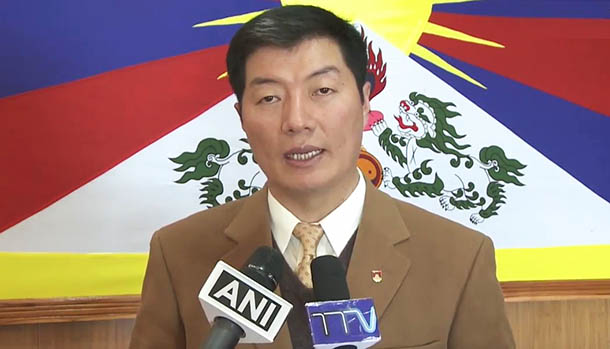Dharamshala, India — Tibetan President Dr Lobsang Sangay on Thursday thanked U.S. President Donald Trump for bravely signing into new law the Reciprocal Access to Tibet Act of 2018, which will impose a strong visa ban on Chinese communist authorities who deny U.S diplomats and other officials, journalists and other citizens access to Tibet.
The Reciprocal Access to Tibet Act is now law, signifying a more vigorous interest by the United States in Tibet and the Tibetan people. This law marks a new era of US support for Tibetans and a challenge to China’s discriminatory policies in Tibet. Following unanimous passage by both the House and the Senate, President Donald Trump signed it on December 19, 2018.
The legislation calls for American diplomats, journalists and ordinary citizens to have equal access to the Tibet Autonomous Region and other Tibetan areas as their Chinese counterparts enjoy in the US.
The new law will require the U.S Department of State to report to the Congress annually regarding the level of access Chinese authorities granted U.S. diplomats, journalists, and tourists to Tibetan areas in China. The law also seeks to promote access to Tibet for U.S. diplomats and other officials, journalists and other citizens by denying U.S. entry for Chinese officials deemed responsible for restricting access to Tibet.
Welcoming the historic legislation on Thursday, President of the Central Tibetan Administration Dr Lobsang Sangay said, “The Reciprocal Access to Tibet Law will not only make the perpetrators of human rights violations accountable but also bolster institutional and diplomatic engagement on Tibet. Again I thank the US Congress for passing the landmark bill and International Campaign of Tibet and everyone who contributed to making this a reality.”
“This is a very courageous step and sends the right message of hope and justice to Tibetans in Tibet. On behalf of six million Tibetans I extend profound appreciation to the President for signing the bill into law,” President said.
The Reciprocal Access to Tibet Act was introduced in the House of Representatives by Representatives Jim McGovern (D-Mass.) and Randy Hultgren (R-Ill.) and in the Senate by Senators Marco Rubio (R-Fla.) and Tammy Baldwin (D-Wisc.). On 25 July this year, the bill was approved unanimously by the House Judiciary Committee and was passed by the entire House two months later. On 28 November, the Senate Foreign Relations Committee unanimously approved the bill and it passed the full Senate on December 11, 2018.
Under the new law, the State Department shall report to Congress annually, identifying individuals who were blocked from U.S. entry during the preceding year and a list of Chinese officials who were substantially involved in the formulation or execution of policies to restrict the access of U.S. diplomats, journalists, and citizens to Tibetan areas.
This campaign created new dynamics on the ground, which the leadership of Tibet's government-in-exile can now encourage political leaders in Canada, the United Kingdom, Australia and countries in Europe who are calling for a similar reciprocal access to Tibet law for the citizens of their respective countries.”
Since Xi Jinping gained power in 2013, he has retained and even intensified its hard-line policies against Tibetans in Tibet. Xi is now the most powerful Chinese authoritarian ruler since Mao and has moved the system back toward one-man rule- a neo-totalitarian party-state. Under Xi's firm hand, dictatorial controls and censorship have been tightened relentlessly, particulary in Tibet.
The Chinese Communist totalitarian regime began their invasion of Tibet in 1949, reaching complete occupation of the country in 1959. Since that time, more than 1.2 million people, 20% of the nation's population of six million, have died as a direct result of China's invasion and occupation. In addition, over 99% of Tibet's six thousand religious monasteries, temples, and shrines, have been looted or decimated resulting in the destruction of hundreds of thousands of sacred Buddhist scriptures.


![Tibet has a rich history as a sovereign nation until the 1950s when it was invaded by China. [Photo: File]](/images/stories/Pics-2024/March/Tibet-Nation-1940s.jpg#joomlaImage://local-images/stories/Pics-2024/March/Tibet-Nation-1940s.jpg?width=1489&height=878)
















